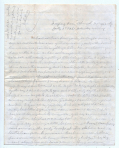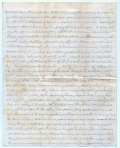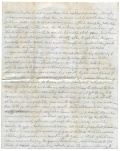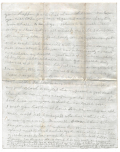site search
online catalog
VERY UNCOMMON EARLY WAR CONFEDERATE LETTER – LT. PAGE, 2nd VIRGINIA CAVALRY

$225.00 ON HOLD
Quantity Available: 1
Item Code: 2024-668
Lieutenant Edwin Randolph Page wrote this letter to Mrs. Edwin R. Page, on July 3rd, 1863. Lieutenant Page was a 39-year-old lawyer from Campbell County, Virginia, when he commissioned and mustered into Company I of the 2nd VA Cavalry on June 8th, 1861. When he failed to be reelected as an officer, he resigned on April 25, 1862.
In this letter from Frying Pan Church in Fairfax County to Campbell Court House, he opens as many did by gently requesting more letters. He mentions not hearing from her ‘for several days’ and going to Manassas and being disappointed in having no letter to receive. He talks of being busy with the duties of an officer (forms and paperwork) and being stationed with “Tom’s Company” in a remote place near Centreville with only pickets and videttes between them and the enemy. Soon, he will likely move about 12 miles toward Leesburg.
The previous night, Edwin says, “we were alarmed twice by the firing of our picket guard, first one shot and then four in rapid succession. I had ordered our men to picket their horses in front of their tents and to sleep with their saddles and arms within reach, and in less than five minutes after the alarm guns were fired I had them draw up in line ready to receive the enemy, but they did not come. The pickets fired at some persons they saw lurking about the station who were either scouts or spies it is supposed. They killed one of them but it is not ascertained certainly.” He continues, “We sent our first scouting party this morning, 16 of our men with 16 of Tom’s. We have two of the wise troopers with us, little John Alexander and Sam Henry Early. There were several more of them who wished to join our company but could not get off. The wise troop are doing nothing but frolicking and enjoying themselves, they have some very good fighting material but the principal men or any of them haven’t much notion of fighting or accounting the hardships of active duty until they are obliged to do it.”
More of discussed of seeing friends from home with on duty and an interesting incident is detailed – “I have just been out to see one of our men Phil Durphy, who has shot himself in the foot. He has been out this morning on the picket guard with a double barrel shotgun, and came back on back with his gun cocked. Directly after he got here his gun went off and the whole load went through his foot at the joint about the big toe, the surgeon is examining it now.”
Edwin goes on to update his “darling” wife on the condition of mutual friends in the company and the condition of the horses – which appear to be personal mounts and known to Mrs. Page. Obviously missing his wife greatly, he offers to write as often as he can but cautions her against assuming the worst should they get busy and time to write is short. He says that in the event of his death or wounding, she will be notified right away and that “the reason I take pleasure in writing to you is that I believe that I am ministering to your pleasure, and I would to God devote my whole life to administering to your happiness and that of our children.”
He signs off on a stirring note by saying, “I want you to take little Marian in your arms and hug her close and kiss her on the mouth and both cheeks and will put both arms around your neck and kiss you.”
The letter is in good condition and written in pencil. It was folded into six sections (once horizontally and 3 vertically) to fit into the small cover. Writing encompasses four unlined pages in total. The cover is clean and addressed to “Mrs. Edwin R. Page/Campbell Court House/Virginia” with a postage paid partial ink stamp. Written in pencil on the reverse is “Leesburg, VA 7 – 4 – 61”. The cover measures 5.5” x 3.15”, while the letter (folded in half vertically) measures 9.75” x 7.74”.
The Frying Pan Spring Meeting House witnessed much Civil War activity. Union and Confederate military records mention the location numerous times as a meeting place and a site of skirmishes. In 1861 and 1862, encampments of Confederate troops occupied the surrounding woods and fields. Confederate Cavalry General J.E.B. Stuart and partisan ranger Colonel John Singleton Mosby and their men often stopped here. Nearby, Mosby and his men received crucial information from Confederate sympathizers. The building was pressed into service as a field hospital for the sick and wounded by the Confederate Army. At least three Confederate veterans are buried in the cemetery. The Frying Pan Spring Meeting House has survived changing land use, the Civil War, and major 20th century suburban growth to earn designation as a Virginia Landmark and a National Register of Historic Places site.
A scarce, long letter from the early days of the Civil War. Sure to be a feature of any ephemera collection. [sr][ph:L]
~~~~~~~~~~~~~~~~~~~~~~~~~~~~~~~~~~~
THIS ITEM, AS WITH ALL OTHER ITEMS AVAILABLE ON OUR WEB SITE,
MAY BE PURCHASED THROUGH OUR LAYAWAY PROGRAM.
CLICK HERE FOR OUR POLICIES AND TERMS.
THANK YOU!
Inquire About VERY UNCOMMON EARLY WAR CONFEDERATE LETTER – LT. PAGE, 2nd VIRGINIA CAVALRY
For inquiries, please email us at [email protected]
Most Popular
Historical Firearms Stolen From The National Civil War Museum In Harrisburg, Pa »
Theft From Gravesite Of Gen. John Reynolds »
Selection Of Unframed Prints By Don Troiani »
Fine Condition Brass Infantry Bugle Insignia »
British Imported, Confederate Used Bayonet »
Scarce New Model 1865 Sharps Still In Percussion Near Factory New »
featured item
JULY 1863 LETTER BY FAMED COL. JOSHUA LAWRENCE CHAMBERLAIN OF THE 20TH MAINE
This letter comes from the hand of famed Colonel Joshua Lawrence Chamberlain of the 20th Maine and is written to his wife from his shelter tent in the Shenandoah Valley near Front Royal. Dated July 24th 1863, Col. Chamberlain details the fight of… (557-250). Learn More »
site search
Upcoming Events
May 16 - 18: N-SSA Spring Nationals, Fort Shenandoah, Winchester, VA Learn More »








